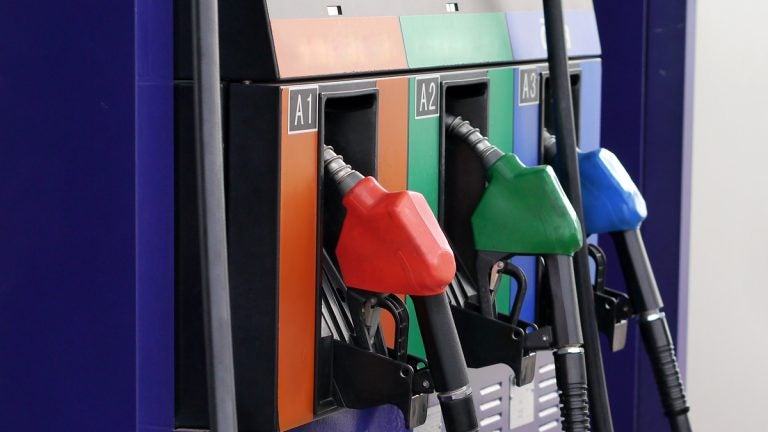Why New Jersey’s gas tax could go up for the first time since 1988

New Jersey's gas tax is 14.5 cents per gallon. Only Alaskans pay less. (Shutterstock)
Gov. Chris Christie and state legislative leaders are now focusing on how to refinance the state’s Transportation Trust Fund, which currently provides $1.6 billion a year in state funding for highway, bridge, and mass-transit construction projects.
The TTF program approved in 2011 was supposed to run five years, but four years of overborrowing by the Christie administration will leave the program $800 million short in the upcoming budget year.
The original Transportation Trust Fund, which was created by Gov. Thomas H. Kean in the mid-1980s, was funded on a pay-as-you-go basis out of gas-tax revenues, and now transportation advocates, Democratic legislative leaders, and even Christie are looking at motor-fuels tax increases as an option to finance a new five-year transportation capital program.
How does New Jersey tax gasoline sales? Like many states, New Jersey taxes gasoline both at the pump and at the refinery or distribution level. New Jersey imposes a 10.5-cent-per-gallon gasoline excise tax on retail gas sales and a 4-cent-per-gallon petroleum products gross-receipts tax on motor fuels that is levied on refineries and distributors and then passed along to motorists. That adds up to a 14.5-cent total motor-fuels tax, as calculated by the American Petroleum Institute, the oil and gas industry advocacy group that tracks gasoline excise taxes, petroleum products gross-receipts taxes, sales taxes on gasoline, and other levies in every state.
How do New Jersey gas taxes compare to other states? New Jersey has the highest property taxes in the nation, and among the highest income, inheritance, and estate taxes, but when it comes to gas taxes, New Jersey is at the bottom. New Jersey has not raised its gas tax since 1988, and with Wyoming’s passage of a 10-cent increase in its gas tax to 24 cents, New Jersey ranks 49th in the nation, ahead of only oil-rich Alaska’s 8-cent-per-gallon tax.
How about New York and Pennsylvania? New York State has the highest gas tax in the nation at 50.5 cents a gallon, but Pennsylvania is expected to pass New York by 2017. Pennsylvania, under Republican Gov. Tom Corbett, hiked its 32.3-cent gas tax to 41.8 cents per gallon this year, and Pennsylvania’s gas tax is scheduled to hit 58 cents a gallon three years from now.
Why are New Jersey gas taxes so low? Republicans elected in the antitax landslide that toppled Democratic Gov. Jim Florio were reluctant to raise any tax, and Democratic Gov. Jim McGreevey rejected a proposal by a blue-ribbon commission to raise gas taxes by 12.5 cents per gallon in 2003. Democratic Gov. Jon Corzine avoided raising the gas tax for the FY2007-FY2011 Transportation Trust Fund by a series of fiscal maneuvers that extended the state’s bond repayment schedule to 32 years and dedicated all of the current 14.5-cent-per-gallon motor fuels tax to paying off that debt.
Christie then avoided raising the gas tax by cancelling the Access to the Region’s Core (ARC) rail tunnel and redirecting $3.1 billion in Port Authority and New Jersey Turnpike toll revenue originally earmarked for the tunnel to provide pay-as-you-go funding for TTF. It was Christie’s subsequent diversion of $1.3 billion in Turnpike tolls to balance his budget — and his failure to provide $500 million in promised state pay-as-you-go revenues that made the TTF run out of money a year early. That’s why Christie and legislators are looking at raising motor-fuels taxes now.
Does the petroleum products gross-receipts tax only apply to gasoline? No, it also covers fuel oils and aviation fuel used in takeoffs and landings from New Jersey airports, but not fuel used in flight. That’s about it. The Division of Taxation defines the petroleum products gross-receipts tax as a tax “imposed on all companies engaged in refining and/or distributing petroleum products for distribution in this State. It applies to the first sale, not for export, of petroleum products within New Jersey.”
But home heating oil, propane gas and gasoline used for residential heating are exempt from the tax, as are petroleum products used by ships in interstate commerce. So are sales of asphalt and polymer-grade propylene used to manufacture polypropylene, a common thermoplastic polymer resin used widely by industry And starting in 2011, the Legislature phased out fuel used by any utility, cogeneration facility, or wholesale generation facility to generate electricity.
Is there a difference to motorists — or to refineries — if the state raises the gas tax or the petroleum products gross-receipts tax? Probably not much, although the petroleum products gross-receipts tax would also apply to some aviation fuel and fuel oils that might not be covered by the gas tax. Jim Benton, president of the New Jersey Petroleum Council (and of the New Jersey Society for Environmental, Economic Development) notes that New Jersey’s refineries in Linden and Paulsboro not only collect petroleum products gross-receipts taxes, but also are a primary collector of gasoline excise taxes as a result of changes put in by the Christie administration. Both taxes are passed along directly to motorists.
Should New Jersey follow the lead of some other states that impose a sales tax or percentage tax on motor fuels? Levying gasoline-excise taxes or petroleum products gross-receipts taxes on a per-gallon basis is easier for the companies that collect them, and it is also easier for Treasury officials to predict because gasoline use varies less than gasoline prices. “We have a very volatile commodity in crude oil prices, and while the price of gasoline goes up, it also goes down at times,” Benton noted. “We’re all enjoying lower gas prices this summer as motorists, but the Treasury Department is still collecting the same tax per gallon.”
However, Martin Robins, director emeritus of Rutgers University’s Alan M. Voorhees Transportation Policy Center, argues that gasoline taxes levied on a per-gallon basis will begin to go down when auto makers begin complying with federal requirements for higher vehicle-mileage efficiency. “New Jersey hasn’t raised its gas tax since the late 1980s, and a lot has happened in transportation policy since then,” he said. “More and more states are going to a percentage-based tax that rises when gasoline prices rise, and that will be increasingly important.”
_______________________________________________
NJ Spotlight, an independent online news service on issues critical to New Jersey, makes its in-depth reporting available to NewsWorks.
WHYY is your source for fact-based, in-depth journalism and information. As a nonprofit organization, we rely on financial support from readers like you. Please give today.




